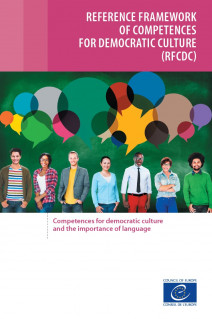Achievement in education depends to a large degree on developing competence in language. Learning CDC no exception.
This publication demonstrates that language is present in all aspects of education, including the learning of competences for democratic culture. Everyone involved in education needs to be aware of how language influences learning. There are clear implications for educators themselves, but also for others. Educators should include attention to language in their courses, regardless of the subject. Curriculum designers and materials producers should refer to the language dimension of teaching and learning in their texts and advice to teachers. Policy makers should ensure that language matters are a high priority and are explicitly stated in policy documents.
However, educators do not need to be language specialists, therefore the issues and consequences for practice found in this publication are clear and accessible to everyone.
COMPETENCES FOR DEMOCRATIC CULTURE AND THE IMPORTANCE OF LANGUAGE
Who is this guidance document for?
Purpose and overview
LANGUAGE(S) OF SCHOOLING/LEARNING
Language as system and language as discourse
Academic language
Language and learning
Language as subject
Language and learning in other subjects
Language in CDC as subject
Language in CDC across the curriculum
Language in the teaching of CDC as knowledge and teaching CDC as process
CDC, SKILLS DEVELOPMENT AND LANGUAGE CONCLUSION
Further reading
REFERENCES









